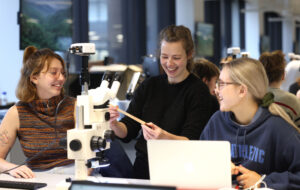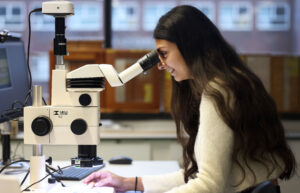Geography and Planning
UCAS code L7K4
- Study mode
- Full-time
- Duration
- 3 years
- Start date and application deadlines
-
- Start date
UCAS code L7K4
Studying Geography and Planning will help you to look and think about the world differently. It offers a unique insight into how our towns, cities and rural areas develop, and how you can support these changes. Our Geography and Planning BA (Hons) programme blends the problem-solving nature of our planning degrees with an understanding of geographical concepts and processes that shape our knowledge of the world around us. With a pioneering approach to planning and regeneration, Liverpool is an ideal location to study how our world in changing.
Our Geography and Planning BA programme draws equally from both disciplines, with some flexibility to enable the inclusion of optional sociology modules, offering an interdisciplinary and varied degree programme.
The programme provides you with knowledge of the challenges facing modern society, the means to interpret diverse phenomena, and an understanding of the conceptual and philosophical arguments surrounding human interactions with the environment.
Students are supported to acquire and enhance their oral, written, and visual communication skills and engage in group-based problem solving and practical work, gaining skills that are readily transferable to the workplace.
Residential field classes are an integral part of the degree programme.
This course was designed as part of a suite of strongly-related programmes, and core modules in years one and two are shared between Planning programmes and Geography BA (Hons). This allows students to transfer between these courses in the first two years of study should their interests or career aspirations change.
A number of the School’s degree programmes involve laboratory and field work. Fieldwork is carried out in various locations, ranging from inner city to coastal and mountainous environments. We consider applications from prospective disabled students on the same basis as all other students, and reasonable adjustments will be considered to address barriers to access.

We’re proud to announce we’ve been awarded a Gold rating for educational excellence.
Discover what you'll learn, what you'll study, and how you'll be taught and assessed.
The first year of study introduces you to the foundations of both geography and planning, covering a number of key issues in geography including climate change, globalisation, and sustainability and the fundamental features of the UK planning system, and an awareness of the broad social, economic and environmental context in which contemporary planning issues arise. You will be supported to acquire and enhance your oral, written and visual communication skills and engage in group-based problem solving and practical work, gaining skills that are readily transferable to the workplace. A field day early in the first semester enables you to begin applying your learning to a real life setting straight away.
Students will take the following compulsory modules and select one optional module detailed below.
Programme details and modules listed are illustrative only and subject to change.
In year two, principles, theory and skill levels are central components of our teaching to enable you to develop and engage deeply with module material. For example, you will gain further understanding of geographic theory, social statistics, strategic planning and place making. You will also have a choice of field classes in various locations in the UK. You also continue to develop critical thinking and communication skills to enable you to analyse material and communicate ideas effectively. Project work also enables you to develop an awareness of the methodological and spatial design issues that arise in the development of planning schemes.
Students will take the following compulsory modules, one field class optional module, one geography optional module and one planning optional module.
Programme details and modules listed are illustrative only and subject to change.
Year three offers you flexibility and choice to tailor your degree to your interests and developing expertise in both geography and planning. You are able to select modules that challenge you, enable you to explore areas of specialist knowledge and develop previous learning, as well as continue to develop your analytical, communication and research skills. You will also complete a dissertation on a topic of your choice and you have multiple field class options to choose from.
Students select one required dissertation module, one required field class module and a further two Geography and two Planning optional modules.
Programme details and modules listed are illustrative only and subject to change.
Planning education has an important vocational focus and in Liverpool we consider a real-world connection to be extremely important. Our students gain a broad understanding of planning, from the ways in which towns and cities have evolved and are being reshaped to meet the challenges of the 21st century to the effects of planning on the environment and planning’s role in urban regeneration.
To do this we have designed varied programmes of study with a range of teaching styles. You will ‘learn by doing’ through place-based projects and field classes as well as be introduced to real-life examples from around the world.
Our courses also include specialised training in geographic information systems, mapping, and urban design. Together these approaches ensure that you gain valuable transferable skills whilst studying with us.
Please note: A number of the School’s degree programmes involve laboratory and fieldwork. The fieldwork is carried out in various locations, ranging from inner city to coastal and mountainous environments. We consider applications from disabled students on the same basis as all other students, and reasonable adjustments will be considered to address barriers to access.
Assessments are designed around developing skills and styles of communication that will be relevant to future employers. So, in addition to exams and essays, you will also undertake assessments that include computer-based exercises, oral presentations, policy briefs, poster presentations, field projects, research reports, design work, group work, seminar presentations and papers. Students complete a compulsory dissertation or project module in the final year on a topic of your choice. This is your opportunity to develop skills as an independent academic researcher, supported on a one-to-one basis by an expert in the field.
We have a distinctive approach to education, the Liverpool Curriculum Framework, which focuses on research-connected teaching, active learning, and authentic assessment to ensure our students graduate as digitally fluent and confident global citizens.
The Liverpool Curriculum framework sets out our distinctive approach to education. Our teaching staff support our students to develop academic knowledge, skills, and understanding alongside our graduate attributes:
Our curriculum is characterised by the three Liverpool Hallmarks:
All this is underpinned by our core value of inclusivity and commitment to providing a curriculum that is accessible to all students.
The qualifications and exam results you'll need to apply for this course.
| Qualification | Details |
|---|---|
| A levels |
BBC |
| BTEC Level 3 national extended diploma |
DDM |
| BTEC combinations |
BTEC National Diploma DM plus grade B at A level; BTEC National Extended Certificate M plus grade BB at A level. |
| Welsh Baccalaureate Advanced |
C in the Welsh Baccalaureate, plus BB at A level. |
| Access |
Pass relevant Access to HE Diploma with 45 Level 3 credits with 27 at Distinction and 18 at Merit |
Studying with us means you can tailor your degree to suit you. Here's what is available on this course.
University of Liverpool students can choose from an exciting range of study placements at partner universities worldwide. Choose to spend a year at XJTLU in China or a year or semester at an institution of your choice.
Immerse yourself in Chinese culture on an optional additional year at Xi'an Jiaotong Liverpool University in stunning Suzhou.
Broaden your world by spending an additional year of study at a partner university abroad following your second year of study.
Take a semester of your second year of study at one of our worldwide partner institutions.
Spend a summer abroad on a study placement or research project at one of our worldwide partner institutions.
Year in industry placements give you an in-depth workplace experience where you can develop your skills and apply your learning.
You don't need to decide now - you can choose to add a year in industry after you've begun your degree.
To spend a year in industry, you'll need to secure a placement with an organisation. If you're unable to find a placement, you'll continue with the standard version of the course without a year in industry.
Every student at The University of Liverpool can study a language as part of, or alongside their degree. You can choose:
The Department of Geography and Planning forms part of our School of Environmental Sciences and is based in the Roxby building. Teaching will take place here and in a number of other world-leading facilities that have benefitted from a £1.38million investment.






From arrival to alumni, we’re with you all the way:

Want to find out more about student life?
Chat with our student ambassadors and ask any questions you have.
Our Institute of Environmental Management and Assessment accredited programme ensures that you are fully qualified to enter this dynamic profession on graduation. This interdisciplinary course has a strong vocational focus, preparing Liverpool graduates for a wide range of planning careers.
If you wish to continue your education beyond your undergraduate degree we also offer a range of postgraduate degrees, including our RTPI accredited Master of Civic Design.
We also offer a series of specialist postgraduate programmes including:
Career paths taken by our recent graduates include:
Our recent graduates have found employment with the following:
90% of geography and planning students are in work and/or further study 15 months after graduation.
(Discover Uni, 2018-19.)
Your tuition fees, funding your studies, and other costs to consider.
Full-time place, per year - £9,535
Year in industry fee - £1,905
Year abroad fee - £1,430 (applies to year in China)
Full-time place, per year - £26,600
Year in industry fee - £1,905
Year abroad fee - £13,300 (applies to year in China)
The tuition fees shown are correct for 2025/26 entry. Please note that the year abroad fee also applies to the year in China.
Tuition fees cover the cost of your teaching and assessment, operating facilities such as libraries, IT equipment, and access to academic and personal support. Learn more about paying for your studies.
We understand that budgeting for your time at university is important, and we want to make sure you understand any course-related costs that are not covered by your tuition fee. This could include expenses such as field clothing and sustenance (food and drinks) during fieldwork.
Find out more about the additional study costs that may apply to this course.
We offer a range of scholarships and bursaries that could help pay your tuition and living expenses.
If you’re a UK student joining an undergraduate degree and have a household income below £35,000, you could be eligible for a Liverpool Bursary worth up to £2,000 for each year of undergraduate study.
Apply for an Asylum Seekers Scholarship and you could have your tuition fees paid in full and receive help with study costs. You’ll need to have applied for asylum in the UK, or be the dependant of an asylum seeker, and be joining an eligible undergraduate degree.
If you’ve spent 13 or more weeks in Local Authority care since age 14, you could be eligible for a bursary of £3,000 per year of study. You’ll need to be a UK student joining an eligible undergraduate degree and be aged 28 or above on 1 September in the year you start.
Are you a UK student with a Black African or Caribbean heritage and a household income of £25,000 or less? You could be eligible to apply for a Cowrie Foundation Scholarship worth up to £8,000 for each year of undergraduate study.
If you’re a UK student identified as estranged by Student Finance England (or the equivalent UK funding body), you could be eligible for a bursary of £1,000 for each year of undergraduate study.
Joining a School of Biosciences degree and have a household income of less than £25,000? If you’re a UK student, you could apply to receive £4,500 per year for three years of your undergraduate course.
Do you live in the Liverpool City Region with a household income of £25,000 or less? Did neither of your parents attend University? You could be eligible to apply for a Nolan Scholarship worth £5,000 per year for three years of undergraduate study.
Are you a UK student with a household income of £25,000 or less? If you’ve participated in an eligible outreach programme, you could be eligible to apply for a Rigby Enterprise Award worth £5,000 per year for three years of your undergraduate degree.
Are you a UK student with a household income of £25,000 or less? Did neither of your parents attend University? You could be eligible to apply for a ROLABOTIC Scholarship worth £4,500 for each year of your undergraduate degree.
Apply to receive tailored training support to enhance your sporting performance. Our athlete support package includes a range of benefits, from bespoke strength and conditioning training to physiotherapy sessions and one-to-one nutritional advice.
Joining a degree in the School of Electrical Engineering, Electronics and Computer Science? If you’re a UK student with household income below £25,000, you could be eligible to apply for £5,000 a year for three years of study. Two awards will be available per academic year.
If you’re a young adult and a registered carer in the UK, you might be eligible for a £1,000 bursary for each year of study. You’ll need to be aged 18-25 on 1 September in the year you start your undergraduate degree.
Use our handy chatbot for your Clearing enquiries.
Last updated 17 June 2025 / / Programme terms and conditions